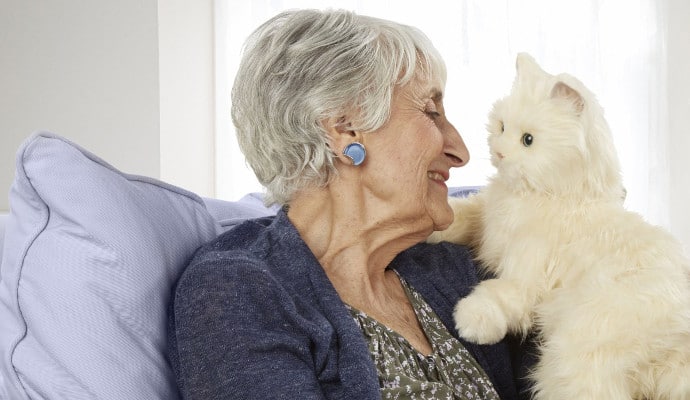When the present becomes confusing for someone with dementia, the past can be a comforting and vivid sanctuary. Reminiscence therapy taps into this powerful source of joy and connection by gently guiding your loved one back to the memories that shaped them.
It’s more than just looking at old photos; it’s a meaningful way to engage their mind, affirm their identity, and spark moments of pure happiness. Let's explore four simple, heartfelt ways to use this powerful therapy to bring light and connection into their daily life.

Reminiscence Therapy Helps Seniors with Dementia
Reminiscing, or sharing memories from the past, is an enjoyable way to connect with someone with Alzheimer’s disease or dementia.
With dementia, people typically lose short-term memory but often retain older memories.
The goal of reminiscence therapy is to help seniors with dementia feel valued, contented, and peaceful by recalling happy times from their past.
The positive feelings gained from sharing pleasant memories can decrease stress, boost mood, reduce agitation, and minimize challenging behaviors like wandering, anger, and more.
To stimulate memories and meaningful conversation, we share four engaging activities to help your older adult reminisce in a pleasant, relaxed way.
We also explain the benefits of reminiscence therapy, how it differs from memory recall, what to do if a painful memory arises, and how to set up the activity for success.
The Benefits of Reminiscence Therapy for Dementia
Reminiscence therapy can give seniors with dementia a feeling of success and confidence because it’s something they’re still able to do.
It allows them to talk and share something meaningful rather than listen to others speak.
Talking about happy memories of the past also brings joy, which is especially helpful if your loved one is having a hard time with everyday life – it helps them cope with stress.
There's a Difference Between Reminiscing and Remembering
Reminiscing is not the same as asking someone to remember something from the past.
Remembering something specific, even from long ago, can be stressful for someone with dementia because they’re likely to feel pressured or put on the spot.
In contrast, when a pleasant memory floats up, and they share it with you, they’ll feel good.
For example, your aging loved one might not remember or know how to answer a simple question like “Where did you grow up?” That could make them feel embarrassed or angry.
But if you’re looking through old photographs, they might spontaneously say, “Oh, look, there’s my house. My mom baked my favorite cookies every Saturday – chocolate chip.”
What to Do if Reminiscence Brings Up Painful Memories
You never know which memories will come up when reminiscing. Sometimes a painful or unhappy memory will surface.
This isn’t inherently problematic, but it’s essential to respond with kindness and understanding.
You know your loved one best, so if something negative comes up, you’ll have a better idea of whether to listen and offer support or gently steer them toward a happier memory so they don’t get stuck in a sad, distressed state.
How to Make Reminiscence Therapy Successful
The goal of reminiscence therapy for dementia is to enjoy time with an older adult and set the stage so they have a chance to talk about any memories that might come up.
For best results, plan for a time of day when they’re most interested in activities. For many older adults, that tends to be earlier in the day.
Next, choose a quiet, comfortable location where they can hear and see you well.
If your older adult doesn’t recall any memories during the activity, that’s absolutely fine – maybe nothing came to mind at that moment.
4 Gentle Reminiscence Therapy Activities
Memories can be associated with different parts of the brain, so it’s helpful to try activities that stimulate other senses.
Use these four ideas to spark your imagination and identify additional ways to reminisce that are specific to your loved one's interests.
1. Listen to their favorite music
Music helps people reminisce and relate to emotions and past experiences.
That’s why it’s often recommended for people with Alzheimer’s or dementia. And it’s even been shown to reach seniors with advanced dementia.
You can play their favorite songs, have a little sing-along, or play music on simple instruments like shakers, bells, tambourines, or a DIY drum.
2. Look at photos, keepsakes, or magazines
Pictures or keepsakes that bring back memories are another excellent way to reminisce. Photos of family, friends, and significant life events are excellent choices.
Photos of things that remind them of their favorite hobbies are also great.
For example, someone who loves gardening might enjoy browsing a gardening magazine or a plant catalog.
And someone who loves to cook might like a gourmet magazine with beautiful food photos. The same applies to sports, crafts, and historical events.
3. Smell familiar scents and taste favorite foods
Smell is a powerful way to access memories.
You could create scent cards or jars using spices or essential oils to remind them of favorite foods or places – like fresh-baked cookies or a pine forest near their childhood home.
Taste is another excellent way to evoke fond memories.
Maybe your older adult always made a special dish for holiday celebrations. Now, you could make it for them and reminisce while eating it together. Or, recreate a favorite snack or treat they made for you when you were a child.
4. Enjoy tactile activities like painting, pottery, or other crafts
Touch can also remind someone of the past. Familiar tactile activities such as drawing, painting, pottery, knitting, sewing, and other crafts can trigger old memories.
Even if they can’t participate in these hobbies anymore, doing things like touching paintbrushes, swirling watercolors, scribbling with drawing chalk, squeezing yarn, or playing with fabrics can evoke strong memories.
Another way to use touch is through objects. Wearing or handling favorite pieces of jewelry or accessories (such as a watch or necklace) may trigger memories of significant life events.
Other ideas include bringing out a significant piece of clothing (e.g., a dress or suit) they loved or wore to essential events.
Final Thoughts About Reminiscence Therapy
Incorporating reminiscence into your caregiving is a beautiful way to connect with the person behind the diagnosis. These shared journeys into the past do more than pass the time; they validate your loved one's life story, reduce agitation, and strengthen your bond.
When you listen to a familiar song or look through a cherished album together, you are offering a priceless gift: the reassurance that they are still known, loved, and cherished for all they have been. In the landscape of dementia care, these moments of joyful connection are the brightest landmarks.
Recommended for you:
- Music Seniors Love: Top Songs from Every Generation
- The Positive Effect of Therapy Dolls for Dementia
- Home Dementia Exercise Program Increases Abilities and Improves Symptoms
This article wasn't sponsored, but does contain affiliate links. We never link to products for the sole purpose of making a commission. For more information, see How We Make Money.
About the Author

Connie is the founder of DailyCaring.com and was a hands-on caregiver for her grandmother for 20 years. (Grandma made it to 101 years old!) She knows how challenging, overwhelming, and all-consuming caring for an older adult can be. She also understands the importance of support, especially in the form of practical solutions, valuable resources, and self-care tips.














My mom has dementia and loves looking at photos but sometimes they cause her stress when she doesn’t recall a person, time period in her life or event, and its not always possible to know this in advance… whats a good way to diffuse this situation?
I am thinking just saying that I don’t recall everything either, but not sure thats a good approach.
Also, thank you for the endless, amazing advice & articles. They seem to touch on every issue that arises. I highly recommend to anyone with aging parents/adult that I know. And I use them regularly for my own education.
Your instinct seems like a good response – it might help her feel like you’re both in the same boat. Each person’s response can vary depending on the situation and their mood. We’d suggest trying a few different kind responses that take the pressure off of her to remember the people in the photo and see what seems to work best.
We’re so glad that our articles are helpful! Thanks so much for sharing with fellow caregivers.
Reminiscing is great but can be tough. Pictures bring up memories of people who have passed …this causes my Mom to want to visit her parents who lived close by. Distraction only last for a bit. It’s a daily struggle. I’m running out of fiblets :/
In this situation, you may want to avoid showing any photos that would bring up memories of those who have passed. Instead, you could focus on photos of people who are still alive or of photos of hobbies or places she currently enjoys.
My husband has dementia and a profound hearing loss . However I did get some good ideas for gifts and activities from you. Thank you I do not want my full name posted Thank you
We’re so glad our article gave you some helpful gift and activity ideas!
You might also find more ideas in our Alzheimer’s & Dementia activities section – https://dailycaring.com/tag/alzheimers-dementia-activities/
I agree and of course emotions include fear or frightful memories, heartbreaks and sadness. I found that adding digital movements as seen on some cable music channel broadcast mesmerizes and is an extremely adventurous show and relaxed two of my patients for hours . Light instrumentals during bed time .
RT Elliott
Thank you for the great suggestions!
These are all great ideas when the person is living with you but our situation has my father-in-law in a facility that we have never been allowed in due to Covid. Most of the time he is in lockdown in his room. He is desperately lonely and confused most of the time. We get calls all hours of the night. We did take his phone away for awhile but now he has it back and of course the same thing is happening. He wants to be in his own home. He called 911 saying no one is taking care of him.
We need ideas on how to calm him in the facility. The facility is short handed and we have no idea really what goes on there. Any ideas?
Thank you.
It’s definitely more challenging to comfort someone with dementia over the phone. We’ve got some suggestions in this article that we hope can improve the situation – 6 Ways to Comfort Someone With Dementia in a Nursing Home During Covid-19 https://dailycaring.com/ways-to-comfort-someone-with-dementia-in-a-nursing-home-during-covid-19/
I would like to add that music possesses the ability of evoking emotion, along with that it also helps in bringing back old memories.
Great point! It certainly does.